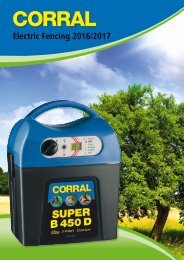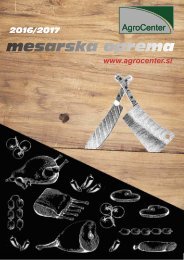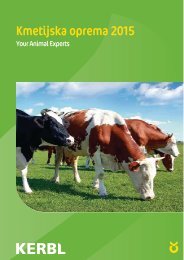ARCOS 2020
You also want an ePaper? Increase the reach of your titles
YUMPU automatically turns print PDFs into web optimized ePapers that Google loves.
procesos
de
fabricación
MANUFACTURING
PROCESSES
PROCESSUS DE
FABRICATION
PROCESSI DI
FABBRICAZIONE
ПРОИЗВОДСТВЕННЫЙ
ПРОЦЕСС
el temple
THE TEMPER · TREMPE · LA TEMPRA · ЗАКАЛКА
El temple es la fase más importante en el proceso de fabricación de
una herramienta de corte. Consiste en un tratamiento térmico del
acero a una temperatura alta (aprox. 1070ºC), manteniéndola durante
un tiempo determinado (tiempo de austenización) y, a continuación,
realizando un rápido enfriamiento a temperatura ambiente, obteniendo
de este modo la transformación de la estructura molecular del acero
(reacción martensítica), que se manifiesta con un aumento de la dureza
del acero. La dureza es la cualidad física necesaria para obtener un
buen poder y durabilidad del corte del cuchillo. Además, la correcta
estructura interna del acero otorga una mayor resistencia a la corrosión.
ARCOS realiza el tratamiento térmico de temple en hornos continuos de
atmósfera controlada y, posteriormente, realiza un segundo tratamiento
térmico –llamado revenido- que consiste en un calentamiento a 250ºC,
para eliminar cualquier tensión creada por el rápido enfriamiento
del temple que pudiese producir fragilidad en el acero, garantizando
las mismas propiedades mecánicas a lo largo de todo el filo de la
herramienta.
The temper is the most important phase in the manufacturing process
of a cutting tool. It consists of a thermal treatment of steel to a high
temperature (around 1070ºC), keeping it during a certain time (time
of austenization) and then, carrying out a quick cooling up to room
temperature, obtaining this way the transformation of the molecular
structure of the steel (martensitic reaction), which becomes evident
with an increase of the hardness of the steel. Hardness is the physical
necessary quality to obtain a good power and cut durability from a
knife. In addition, the right internal structure of the steel grants a major
resistance to corrosion. ARCOS carries out the thermal treatment of
temper in constant furnaces with controlled atmosphere and, later,
carries out a second thermal treatment – so- called tempering - that
consists of a warming to 250ºC, in order to eliminate any tension made
by the rapid cooling of the temper that could produce fragility in the
steel, granting the same mechanical properties along the whole edge of
the tool.
La trempe est la phase la plus importante du processus de fabrication
d’un outil de coupe. La trempe ou trempage consiste à traiter
thermiquement un matériau : l’acier est chauffé à une température
élevée jusqu’à obtenir la température d’austénisation (environ 1070
ºC), puis maintenu en température durant un temps déterminé (temps
d’austénisation), un refroidissement rapide est ensuite réalisé, afin
d’obtenir la transformation de la structure moléculaire de l’acier
(réaction martensitique), qui se manifeste par une augmentation
de la dureté de l’acier. La dureté est la qualité physique nécessaire
à l’obtention d’un bon pouvoir et d’une bonne durabilité de coupe
du couteau. De plus, une bonne structure interne de l’acier confère
une meilleure résistance à la corrosion. ARCOS réalise le traitement
thermique de trempe dans des fours continus à atmosphère contrôlée
et, postérieurement, réalise un second traitement thermique, appelé
revenu, qui consiste à chauffer la pièce à 250 ºC, afin de réduire les
contraintes internes créées durant la trempe susceptibles de fragiliser
l’acier, garantissant les mêmes propriétés mécaniques tout le long du fil
de l’outil.
La tempra è la fase piu’ importante nel processo di fabbricazione di
un utensile da taglio. Consiste nel trattamento termico dell’acciaio a
una alta temperatura (circa 1070°C) e che viene mantenuta durante
un tempo determinato (tempo di austenizzazione) e, in seguito
producendo un rapido raffreddamento a temperatura ambiente,
ottenendo in questo modo la trasformazione della struttura molecolare
dell’acciaio (reazione martensitica) che si manifesta ottenendo un
aumento della durezza dell’acciaio. La durezza è la qualità fisica
necessaria per ottenere un buon potere e una durabilità nel tempo del
taglio del coltello. Inoltre, la corretta struttura interna dell’acciaio ottiene
una maggiore resistenza alla corrosione. ARCOS realizza il trattamento
termico della tempra in forni continui ad atmosfera controllate, realizza
una seconda fase di trattamento termico – chiamato rinvenimento –
consistente in un riscaldamento fino a 250°C per eliminare qualsiasi
tensione che potrebbe determinarsi con il raffreddamento rapido
durante il processo di tempra, che puo’ produrre fragilità nell’acciaio,
garantendo le stesse proprietà meccaniche per tutta la lunghezza del
filo dell’utensile.
Закалка — важнейший этап производства режущих инструментов.
Она заключается в термической обработке стали при высокой
температуре (прибл. 1070 ºC) в течение определенного времени
(время аустенизации) и последующем быстром охлаждении до
температуры окружающей среды, которое вызывает изменение
молекулярной структуры стали (мартенситная реакция) и
повышает ее твердость. Твердость — это физическое свойство,
которое необходимо для получения прочного ножа с хорошей
режущей способностью. Кроме того, правильная внутренняя
структура стали улучшает ее антикоррозионные свойства. ARCOS
производит термическую закалку в печах непрерывного действия
с контролируемой температурой, а затем выполняет вторичную
термическую обработку, так называемый отпуск, который состоит
в нагреве стали до 250 ºC с целью снятия напряжения, которое
возникает в результате быстрого охлаждения стали и делает ее
хрупкой. Это обеспечивает однородность механических свойств
по всей поверхности лезвия ножа.
20














